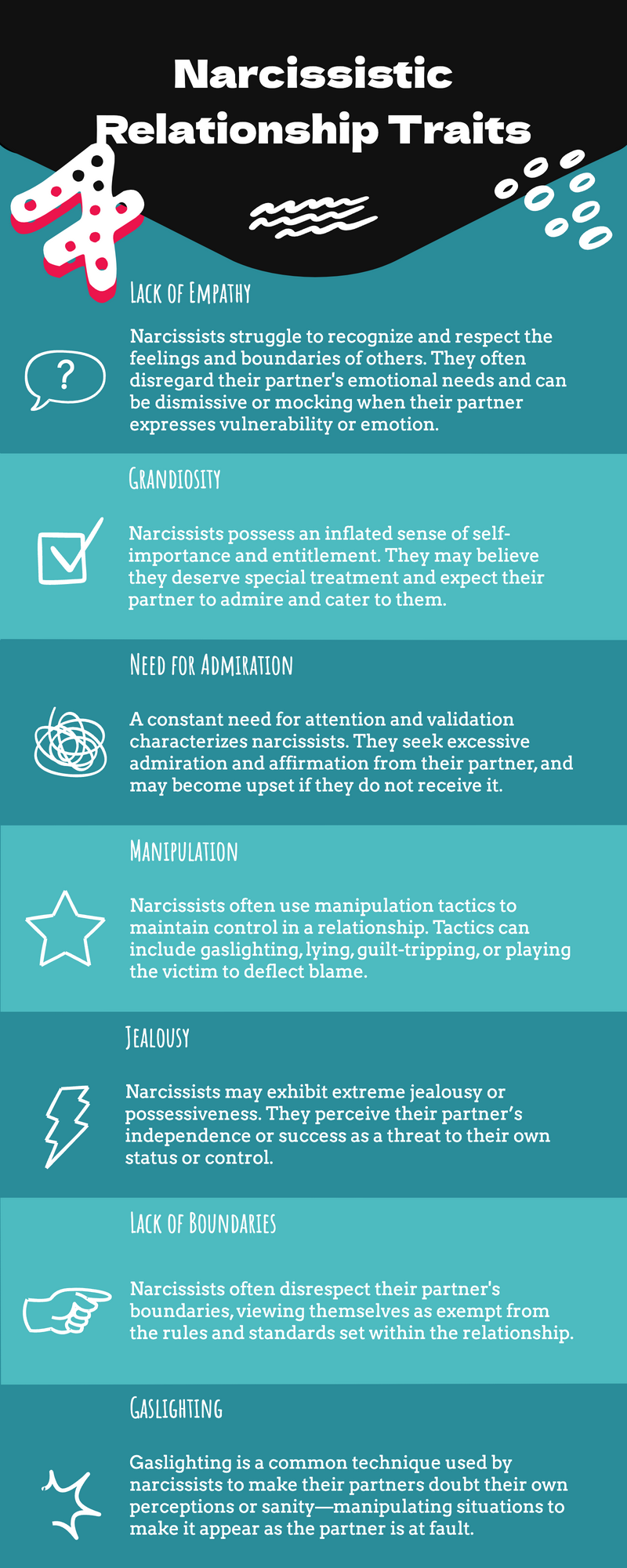Navigating relationship obstacles can sometimes feel like trying to find your way through a complicated maze of emotions and bonds. Recognizing the red flags in your partner’s behavior may feel challenging, but being aware of the 12 signs of a narcissist can help illuminate your path. These valuable cues delve into behaviors that are often concealed, shedding light on the intricacies of relationships. **Knowledge is key**, and after delving into this exploration, you’ll be better equipped to identify subtle traits that could spare you from heartbreak. For those seeking to avoid a tumultuous romantic journey, this information is a game-changer. Are you ready to play the role of a relationship detective? Let’s uncover these hidden truths together and pave the way for healthier connections.

From a charming facade to a lack of empathy and a sense of entitlement, these traits paint a picture of behaviors that can impact a relationship profoundly. As we explore each trait in depth, we unravel the intricacies of narcissistic tendencies that may be hiding in plain sight, prompting us to reassess our own relationships and interactions.
Key Takeaways
- Narcissists demand constant attention and validation in relationships.
- They lack empathy and manipulate their partners for control.
- Narcissists have a sense of entitlement and expect special treatment.
- Setting clear boundaries and seeking support is crucial when dealing with a narcissistic partner.
Excessive Need for Attention
Indulging in a constant quest for validation and admiration, narcissists exhibit an insatiable thirst for attention within relationships. This excessive need for attention stems from deep-rooted insecurities and a fragile sense of self-worth that they attempt to bolster through external validation.
In a relationship, this insatiable hunger for attention manifests in various ways, often leading to emotional abuse and manipulation. Narcissists demand constant admiration and praise from their partner, becoming irritable or hurt if they feel neglected or unappreciated. This behavior creates a toxic dynamic where the narcissist’s needs always take precedence, leaving their partner feeling emotionally drained and unfulfilled.
Moreover, narcissists resort to attention-seeking behaviors such as exaggerated stories, grandiose gestures, or provocative actions to ensure they remain the focal point in the relationship. They thrive on the attention and validation they receive, using it as a tool to maintain control and power over their partner.
This relentless pursuit of attention can lead to a cycle of emotional turmoil and instability, where the partner is constantly walking on eggshells to cater to the narcissist’s insatiable need for validation.
Lack of Empathy

Narcissists in relationships commonly demonstrate a profound inability to empathize with their partners, resulting in emotional neglect and a skewed dynamic where their own needs consistently overshadow those of their significant others. This lack of empathy is a hallmark trait of narcissistic behaviors that can have detrimental effects on the partner involved.
- Dismissal of Emotions: A narcissist may dismiss or invalidate their partner’s feelings, creating a sense of isolation and emotional distress.
- Self-Centered Focus: Narcissists often prioritize their own needs above their partner’s, showing little concern for their emotional well-being.
- Emotional Neglect: Partners of narcissists may experience emotional neglect as their feelings are ignored or belittled.
- One-Sided Dynamic: The relationship becomes one-sided, with the narcissist’s desires taking precedence while their partner’s emotions are neglected.
Recognizing these signs of narcissistic lack of empathy is crucial in dealing with a narcissist and setting boundaries to protect one’s emotional health in the relationship.
Manipulative Behavior
Utilizing a cycle of manipulation techniques, individuals with narcissistic traits exert control over their partners by employing various tactics such as push-pull behavior and intermittent reinforcement. These manipulative behaviors are warning signs in a relationship that can be detrimental to one’s well-being. It is essential to recognize these red flags and set boundaries to protect oneself from falling prey to the narcissist’s tactics.
| Manipulative Behaviors | Impact on Relationship |
|---|---|
| Push-Pull Behavior | Keeps partner off balance |
| Intermittent Reinforcement | Creates dependency on approval |
| Devaluation and Idealization | Manipulates emotions |
| Love Bombing | Keeps partner invested |
Recognizing these behaviors is crucial in safeguarding one’s emotional and mental health. Setting boundaries and being aware of these manipulative tactics can help individuals navigate relationships with narcissists more effectively. Love bombing followed by emotional withdrawal is a common cycle; understanding these patterns can empower individuals to break free from toxic relationships.
Grandiosity

Inflating their sense of self-importance and superiority, individuals with narcissistic traits often exhibit grandiosity through exaggeration of their achievements and abilities. This grandiose sense of self is a key characteristic in narcissistic relationship patterns. Here are four aspects related to this trait:
- Entitlement: Narcissists believe they’re inherently deserving of special treatment and admiration, leading them to expect others to cater to their needs without question.
- Constant Need for Admiration: They seek validation and praise relentlessly, as their self-worth is deeply tied to external approval.
- Belittling Others: To maintain their grandiose image, narcissists may diminish or devalue those around them, reinforcing their perceived superiority.
- Manipulation Tactics: Grandiosity serves as a manipulative tool, allowing narcissists to control and dominate their partners by leveraging their inflated self-image.
Understanding these traits of NPD can shed light on the complexities of a relationship with a narcissist, emphasizing the importance of recognizing manipulation tactics such as love bombing and entitlement in order to navigate these challenging dynamics effectively.
Sense of Entitlement
In relationships with narcissists, the sense of entitlement becomes a pivotal issue. They often believe they’re deserving of special treatment and privileges, expecting constant admiration and control.
This entitlement leads to power imbalances and a significant lack of empathy towards their partner’s needs and emotions.
Power Dynamics
The sense of entitlement in a narcissistic relationship is characterized by the constant expectation of special treatment and control over one’s partner. This entitlement leads to a power dynamic that’s often manipulative and abusive. Understanding the traits of a narcissist in a relationship can shed light on the characteristics of such power dynamics. Here are four key aspects to consider:
- Cycling Behavior: Constantly shifting between pushing their partner away and pulling them back in to maintain control.
- Emotional Manipulation: Using manipulation to create uncertainty and instability, keeping their partner emotionally invested.
- Control and Domination: Believing they’re entitled to dominate their partner and using coercion to maintain power.
- Disregard for Partner: Ignoring or dismissing their partner’s needs and feelings, reacting aggressively when their entitlement is challenged.
Lack of Empathy
Narcissists in relationships often demonstrate a lack of empathy by prioritizing their own desires and disregarding their partner’s feelings and needs. This lack of empathy is a defining trait of narcissistic personality disorder (NPD) and can have profound effects on the dynamics of the relationship.
Mental health professionals recognize this as a key characteristic of narcissists, who often exhibit a sense of entitlement that leads them to believe they deserve special treatment. This entitlement can manifest in a dismissive attitude towards their partner’s emotions and experiences, further exacerbating the lack of empathy.
Additionally, narcissists may consistently put their own wants above their partner’s well-being, showing a blatant disregard for their feelings and opinions.
Constant Need for Admiration

With a constant need for admiration, individuals with narcissistic traits expect unwavering validation and reassurance from their partners, often becoming resentful when attention is diverted elsewhere. This perpetual need for admiration can manifest in various ways within a relationship:
- Demanding Validation: Narcissists may constantly seek praise and recognition to feed their ego, requiring their partner to provide continuous admiration.
- Jealousy and Resentment: Feeling threatened by any attention their partner receives from others, narcissists can react with jealousy or resentment, viewing it as a challenge to their need for constant admiration.
- Neglecting Partner’s Needs: The focus on their own need for admiration often leads narcissists to disregard their partner’s emotional needs, creating an imbalanced dynamic in the relationship.
- Manipulative Behaviors: To maintain a steady stream of admiration, narcissists may resort to manipulative tactics to ensure that their partner’s attention remains solely on them, further reinforcing their constant need for validation.
In a relationship with a narcissist, navigating their unending need for admiration can be emotionally draining and challenging, as their focus remains solely on fulfilling their own desires without regard for their partner’s well-being.
Boundary Violations

Engaging in a pattern of pulling away and then returning, narcissists create a cycle of emotional instability within relationships. This behavior is a hallmark trait of narcissistic individuals, aimed at asserting control and maintaining power over their partner. By consistently oscillating between closeness and distance, the narcissist keeps their partner emotionally invested and vulnerable to manipulation. This cycle of boundary violations can lead to feelings of confusion, anxiety, and a perpetual state of unease within the relationship.
Recognizing these actions as forms of abuse is crucial in establishing and upholding healthy boundaries. Boundary violations by a narcissist can manifest in various ways, such as invading personal space or disregarding privacy. It’s essential to acknowledge that these behaviors stem from the narcissist’s self-serving motives and lack of empathy for their partner’s feelings.
To safeguard oneself, it’s imperative to set clear and firm boundaries with the narcissist and assertively communicate and enforce them. Seeking support from trusted individuals can provide guidance and strength when met with resistance or manipulation from the narcissist. Upholding healthy boundaries is key to protecting one’s emotional well-being in a relationship with a narcissist.
Difficulty Accepting Criticism

Having established the detrimental effects of boundary violations within a relationship, the next significant aspect to explore is the difficulty narcissists face when confronted with criticism.
- Defensiveness: When criticized, a narcissist often reacts defensively, perceiving feedback as an attack on their self-image. This defensive stance can lead to arguments and further conflict within the relationship.
- Dismissiveness: Instead of considering the validity of the criticism, a narcissist may dismiss it altogether, undermining the partner’s concerns and feelings. This dismissive attitude can invalidate the partner’s emotions and needs.
- Anger: Criticism can trigger anger in a narcissist, leading to heated confrontations and emotional outbursts. This anger serves as a defense mechanism to protect their fragile self-esteem and avoid facing their shortcomings.
- Lack of Accountability: One of the key traits of a narcissistic personality is the reluctance to take responsibility for their actions. This lack of accountability can manifest when criticism is deflected onto the partner or when excuses are made instead of acknowledging faults.
In essence, the difficulty accepting criticism is a pervasive trait among narcissists in a relationship, contributing to a toxic and unhealthy dynamic.
Emotional Manipulation

Emotional manipulation is a cunning tactic employed by narcissists to control and influence their partner’s emotions and behaviors within a relationship. Narcissists often employ manipulative tactics such as love bombing to initially entice their partners, showering them with affection and attention before gradually transitioning into controlling behaviors.
This cycle of idealization and devaluation is a common trait in narcissistic relationships, where the partner is left feeling emotionally drained and confused. Gaslighting, a form of manipulation where the narcissist distorts reality to make their partner question their own sanity, is frequently used to maintain power and dominance.
Additionally, guilt, shame, and seeking constant validation are tools narcissists use to control their partners. By playing the victim and deflecting blame onto their partners, narcissists effectively manipulate emotions and perceptions. Emotional outbursts and anger are also utilized as means of intimidation to assert control.
These manipulative behaviors are characteristic of individuals with narcissistic personality disorders and can have detrimental effects on the partner’s mental well-being.
Gaslighting Tactics

Gaslighting tactics employed by narcissists involve manipulative mind games, intentional distortion of reality, and the undermining of their partner’s perception. These insidious behaviors aim to erode the partner’s sense of self and control, fostering dependency and self-doubt.
Recognizing and addressing these tactics is crucial in dismantling the toxic dynamics of a narcissistic relationship.
Manipulative Mind Games
In relationships with narcissists, the manipulation tactics employed often involve distorting reality and causing the victim to doubt their own perceptions and experiences. Gaslighting is a common form of manipulative mind games used by narcissists to maintain control and power over their partners.
Here are four key aspects of gaslighting tactics:
- Denial and Dismissal: Narcissists often deny or dismiss their partner’s feelings and experiences, invalidating their emotions.
- Blame-Shifting: They shift blame onto their partner, making them feel responsible for issues that aren’t their fault.
- Minimization: Narcissists downplay the significance of their partner’s emotions, making them feel like their feelings are insignificant.
- Selective Memory: They selectively remember events to suit their narrative, making their partner question their own memory and sanity.
Understanding these manipulative techniques can help victims recognize and protect themselves from emotional abuse.
Distorting Reality Intentionally
Utilizing deceptive tactics to distort reality intentionally is a hallmark behavior of narcissists in relationships. Gaslighting, a form of psychological manipulation, involves the narcissist denying or dismissing their partner’s feelings and experiences, leading to a sense of invalidation and confusion. By distorting reality, the narcissist aims to make their partner doubt their own perception of events, ultimately gaining control and power over them.
This manipulation tactic involves twisting facts, manipulating conversations, and rewriting history to portray themselves in a favorable light while undermining their partner. Victims of gaslighting often find themselves questioning their sanity and memory, leading to emotional exhaustion and low self-esteem.
Recognizing these gaslighting behaviors is crucial in breaking free from the cycle of manipulation and regaining a sense of self-worth in the relationship.
Undermining Partner’s Perception
Distorting reality intentionally through deceptive tactics is a manipulative behavior characteristic of narcissists in relationships, leading to a sense of invalidation and confusion for their partners. Gaslighting tactics are insidious methods used by narcissists to undermine their partner’s perception, ultimately exerting control and power within the relationship. This form of emotional manipulation can have devastating effects on the partner’s mental and emotional well-being.
Here are four ways in which gaslighting tactics are employed by narcissists:
- Denying or dismissing the partner’s feelings and experiences to make them question their own reality.
- Creating a cycle of confusion and self-doubt by distorting the partner’s perception of events.
- Maintaining control by invalidating the partner’s emotions and experiences.
- Using gaslighting to reinforce power dynamics and manipulate the partner’s sense of self.
Lack of Accountability

The evasion of responsibility characterizes narcissistic behavior in relationships, manifesting as a lack of accountability that undermines trust and communication. Narcissists with Narcissistic Personality Disorder (NPD) often exhibit entitlement, arrogance, and a proclivity for emotional abuse within relationships.
Their refusal to acknowledge their mistakes or take ownership of their actions contributes to a toxic dynamic where the partner is left feeling invalidated and trapped in a cycle of manipulation. By deflecting blame onto others or making excuses, narcissists avoid being held accountable for their behavior, fostering an environment where honest and open communication becomes challenging.
This lack of accountability leads to the partner feeling unheard and constantly questioning their own reality. Gaslighting, a form of psychological manipulation, further reinforces the narcissist’s avoidance of responsibility, ultimately perpetuating a cycle of emotional turmoil and instability in the relationship.
Addressing this trait is crucial in recognizing and navigating relationships with narcissists, as it exposes the detrimental impact of their inability to be held accountable for their actions.
Controlling and Possessive Behavior

Having established a foundation of emotional manipulation through lack of accountability, the shift to controlling and possessive behavior in narcissists further solidifies their power dynamics within relationships. This behavior is a hallmark trait of Narcissistic Personality Disorder (NPD) and can lead to emotional abuse and turmoil within the relationship.
When a narcissist becomes controlling and possessive, they aim to dominate every aspect of their partner’s life, creating a toxic environment of fear and dependency.
- Monitoring and Controlling: Narcissists constantly monitor and control their partner’s activities, dictating who they can spend time with and where they’re allowed to go.
- Jealousy and Possessiveness: They exhibit extreme jealousy and possessiveness, often reacting with anger or suspicion when their partner interacts with others.
- Isolation and Dependency: Narcissists isolate their partner from friends and family, making them reliant on the narcissist for validation and support.
- Manipulation and Control: Through manipulation tactics like guilt-tripping and emotional coercion, narcissists maintain control over their partner’s thoughts and emotions, fostering a sense of power imbalance in the relationship.
Frequently Asked Questions
How Do Narcissists Treat Their Partners?
Narcissists treat their partners with a manipulative push-pull dynamic, creating emotional turmoil. They oscillate between showering attention and disappearing, fostering uncertainty and insecurity. This behavior aims to control and maintain emotional investment, trapping partners in a toxic cycle.
The constant questioning of worth and value leads to emotional exhaustion and instability. Recognizing these patterns and setting boundaries is crucial to breaking free from the damaging cycle of a narcissistic relationship.
How Do Narcissists Behave in Relationships?
In relationships, narcissists exhibit a push-pull dynamic, oscillating between drawing close and withdrawing to maintain dominance and emotional control. This behavior, marked by unpredictability, fosters confusion and instability for their partners.
By manipulating emotions and fostering dependency, narcissists assert power. This cycle of idealization and devaluation serves to ensnare partners, hindering their ability to break free.
This pattern underscores the narcissist’s self-centered nature and disregard for their partner’s well-being.
What Is the Narcissistic Love Pattern?
We’ve delved into the intricate dynamics of a narcissistic love pattern. This cycle typically involves a repetitive pattern of withdrawing and then returning to keep their partner emotionally invested and dependent. It’s a manipulative strategy to maintain control and prevent the partner from leaving.
This behavior often leads to confusion and emotional distress for the partner, reinforcing the need to establish firm boundaries to safeguard against further harm.
How Does a Narcissist Man Act in a Relationship?
We’ve observed that a narcissist man in a relationship often displays manipulative and controlling behavior, seeking constant admiration and attention while lacking empathy for their partner’s feelings.
Their grandiose sense of self-importance and entitlement can lead to a pattern of devaluing and discarding their partner when they no longer serve their needs.
This conduct can leave partners feeling confused, insecure, and emotionally drained, highlighting the detrimental impact of such behavior on relationships.
Conclusion
In conclusion, recognizing the 12 traits of a narcissist in a relationship is crucial for maintaining emotional well-being and setting healthy boundaries. By being aware of these red flags, individuals can protect themselves from manipulation, exploitation, and emotional abuse.
It’s essential to prioritize self-care and seek support when dealing with narcissistic behavior in order to cultivate healthy and fulfilling relationships. Remember, knowledge is power in navigating the complexities of interpersonal dynamics.










